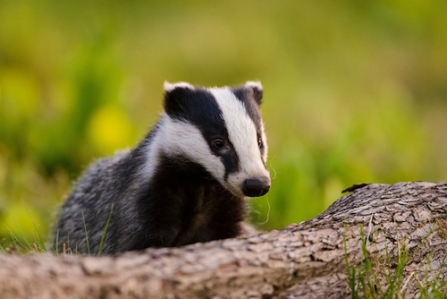I know that some of you may have felt challenged by the public campaign we led last year to oppose the cull here. This is regretful.
We are very conscious of the hardship that bovine TB causes in the farming community and the need to find the right mechanisms to control the disease. However, we believe that a badger cull is not the answer and have been vaccinating badgers as a positive alternative.
Even in the best of times, farming is a difficult business and it is reasonable to rely on the Government and other bodies to supply you with the correct advice and information to ensure your farm’s best interests are covered.
But we believe you have been poorly served by the unsubstantiated, weak science behind culling.
The evidence has always shown that badgers are not the primary cause of the spread of bovine TB in cattle: the primary route of infection is via cow-to-cow contact. These cattle based factors are being increasingly recognized as drivers of the disease, particularly cattle movements and slurry management.
For a cull to be justified in the Government’s terms, bovine TB has to be shown to be endemic in badgers in the area. Derbyshire Wildlife Trust has published a scientific review of the Government’s Animal and Plant Agency (APHA) evaluation of causes of bovine TB in cattle in badgers in the county. It showed that the methodology used to estimate the source of infection in outbreaks of bovine TB in cattle is subjective and biased, without clear evidence to support the claims.
The analysis also showed that APHA’s methodology and data neglected cattle-based risks such as persistent infections as well as shortcomings in testing and the contribution of cattle movements to the spread of bovine TB. There were no data at all on bovine TB incidence in badgers in Derbyshire.
We have long advocated for a long-term solution and, along with many others, were pleased to see the Government commitments to developing cattle vaccines, improving bio-security on farms and phasing out the culling of badgers.
We were extremely disappointed, then, to hear of the potential for culling licenses to be issued in Derbyshire, the county with the largest, most high profile badger vaccination project in the country, funded by DEFRA. The risk of vaccinated badges being shot in a cull was one of the many reasons our campaign received the media attention and public support it did. Nothing has changed in 2020.
In their response to the Godfray Report, which reviewed bovine TB control, the Government said that it wanted to move from lethal to non-lethal forms of disease control in badgers. It also said that one way to do this would be to establish a “Cordon sanitaire’ in defined at-risk parts of the Edge Area…”). Derbyshire forms part of the Edge Area and has the largest and most developed badger vaccination programme in the country. It is ideally placed to put this policy goal into action. Having a cull in Derbyshire would undermine advancement of that goal.
Aside from the needless killing of an iconic species, one of the worst aspects of all of this is how poorly served the farming community has been by weak evidence and half-hearted policy changes. The livelihoods and wellbeing of farming communities are severely damaged by bovine TB outbreaks. You deserve more clarity and better leadership than what has been offered to date.
If you are concerned about bovine TB in badgers on land you manage, then there is an alternative. Badger vaccination is humane and is effective in preventing the spread of bovine TB in badger populations. I would welcome the opportunity to review this option with you.
Please contact me on enquiries@derbyshirewt.co.uk if you would like to discuss this issues further.
Yours sincerely,
Tim Birch
Director of Nature’s Recovery
Derbyshire Wildlife Trust

